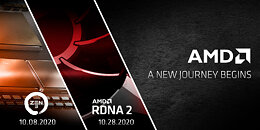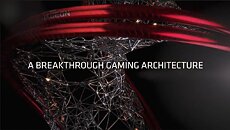Wednesday, September 9th 2020

AMD Announces a Red October: Zen 3 on October 8, RDNA2 on October 28
AMD CEO Dr Lisa Su on Twitter just announced AMD's next-generation Ryzen processors based on the "Zen 3" microarchitecture, and next-generation Radeon RX graphics cards based on the RDNA2 graphics architecture. AMD is promising a "red" October, with next-generation Ryzen "Zen 3" launch on October 8, and next-generation Radeon RDNA2 launch on October 28. We know for sure that AMD is referring to Ryzen and not EPYC, looking at the Socket AM4 MCM animation being used. The teaser picture for Radeon RDNA2 also hints at a new reference cooling solution with large axial fans.
Update 16:54 UTC: In a separate Tweet, AMD announced the Radeon RX 6000 series graphics cards, based on the "breakthrough" RDNA2 graphics architecture.
Sources:
Dr Lisa Su (Twitter), Radeon RX (Twitter)
Update 16:54 UTC: In a separate Tweet, AMD announced the Radeon RX 6000 series graphics cards, based on the "breakthrough" RDNA2 graphics architecture.


141 Comments on AMD Announces a Red October: Zen 3 on October 8, RDNA2 on October 28
Remember that Skylake only had a 32kB L1 data-cache and 256kB L2 cache. Zen2 clobbers that with a 64kB L1 dCache and 512kB L2 cache.
Icelake comes back with 64kB L1 cache and 512kB L2 cache. But not only that, its improving the ROB (register renaming buffers or something like that), and other bits that make Icelake look much wider and probably much better from an IPC perspective.
I don't think Zen2 was ever "clearly better" than Skylake with regards to IPC. It was close, but not necessarily an IPC king. Icelake has a bunch of core-enhancements that should improve IPC dramatically. The question is what clocks can Intel get from their 10nm node. Intel's 14nm node clearly is cost-effective and has very high clocks, so the 10nm IceLake may lose a bit of clock speed.
If the Ryzen 4600 also launches for $250 CAD, that will be another home run. 20 percent better IPC than the 10600k, 1/3 less power consumption, and hopefully finally 4.8ghz clock speeds?
Its not very clear cut. Zen2 was much better than Zen or Zen+, but I'm not convinced that Zen2 took the IPC crown from Skylake yet.
Intel's superior performance in video game benchmarks should leave your head scratching too: Intel can't be getting all of that speed just from clocks, video games talk to RAM a lot (and the GPU) and DDR4 (and GPU) doesn't care about the clockspeed of the CPU. There's something to be said about Intel's superior and low-latency memory controller, which is probably what is affecting video game FPS more than anything else. (Especially when you consider that AMD's chips have superior sized caches).
Anyway, all I can think of is Sean Connery in a sub.
Also Intel's memory controller is not superior. There is a difference between a mesh and ring bus. A mesh is better the more cores you have. A ring bus is better with less cores. AMD doesn't see the need make two different sets of CPUs just to get an extra 3 percent in gaming FPS, especially since IPC and clock speed will solve the slight memory latency deficiency. It isn't an AMD vs Intel thing, it is a conscious choice. Intel also has workstation CPUs that don't use a ring bus, and they've died out, killed by AMD's offerings. The 10980XE anyone?
AMD and Intel both have single-clock add / subtract. AMD had the first dual-AES pipeline (supporting two concurrent AES instructions), so AMD's AES IPC was superior to Intel's AES IPC on Skylake.
What instructions, what conditions, what memory? Its actually very complicated. If we're sitting around adding/subtracting numbers inside of registers all day, both processors tie. MAC instructions, I forget from the top of my head... but you get the picture. Its pretty complicated, because all these CPUs have different speeds for every instruction.
I'll be waiting though to see what AMD has to offer for their new GPUs. If they offer something similar and/or better for less than what Nvidia is bring to the table, I'll get a new GPU from AMD and skip Nvidia this time around.
With Icelake hitting 512kB L2 and 64kB L1 dCache, I don't think there's anything AMD can do to keep up with Intel in this next generation on an IPC basis. The main saving grace, is that Icelake probably won't clock as high (given all the issues on the 10nm node).
I don't think that zen one is fully right, L2 cache is inclusive now.
Seems like Zen is 64kB combined cache per core according to Wikichip. Which means IceLake actually has the L1 cache advantage. Hmmm.
I'm honestly surprised AMD and TSMC can keep up with the multitude of chips they are pushing, between consoles, CPUs, GPUs, and chipsets......
But i guess that intel is out of the game before they even entered :D